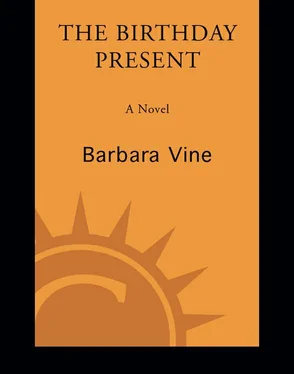Barbara Vine - The Birthday Present
Здесь есть возможность читать онлайн «Barbara Vine - The Birthday Present» весь текст электронной книги совершенно бесплатно (целиком полную версию без сокращений). В некоторых случаях можно слушать аудио, скачать через торрент в формате fb2 и присутствует краткое содержание. Год выпуска: 2008, ISBN: 2008, Издательство: Crown Publishing Group, Жанр: Триллер, на английском языке. Описание произведения, (предисловие) а так же отзывы посетителей доступны на портале библиотеки ЛибКат.
- Название:The Birthday Present
- Автор:
- Издательство:Crown Publishing Group
- Жанр:
- Год:2008
- ISBN:978-0-307-45199-6
- Рейтинг книги:5 / 5. Голосов: 1
-
Избранное:Добавить в избранное
- Отзывы:
-
Ваша оценка:
- 100
- 1
- 2
- 3
- 4
- 5
The Birthday Present: краткое содержание, описание и аннотация
Предлагаем к чтению аннотацию, описание, краткое содержание или предисловие (зависит от того, что написал сам автор книги «The Birthday Present»). Если вы не нашли необходимую информацию о книге — напишите в комментариях, мы постараемся отыскать её.
The Birthday Present
The Birthday Present — читать онлайн бесплатно полную книгу (весь текст) целиком
Ниже представлен текст книги, разбитый по страницам. Система сохранения места последней прочитанной страницы, позволяет с удобством читать онлайн бесплатно книгу «The Birthday Present», без необходимости каждый раз заново искать на чём Вы остановились. Поставьте закладку, и сможете в любой момент перейти на страницу, на которой закончили чтение.
Интервал:
Закладка:
Most newspapers carried a photograph from their archives of Ivor and Juliet taken when he first became a Minister of State. Variations on “Disgraced MP weds” were the captions above these pictures, but since newspapers were no longer delivered to his home, Ivor saw none of them. Juliet had longed for this marriage and now she had got it. Did it make her happy? She said she was happy. At thirty-six she was more beautiful than ever and in the spring she told us she was pregnant. She adored Ivor and said the happiest day of her life was when she told him he was to be a father. According to her, he wept for joy. I wonder. It's well known that victims of stroke or similar blows to the brain often cry very easily. I can only say that in all the time I've known him, I've never seen tears in his eyes.
Was it the present Ivor or the memory of what he had been that Juliet loved? Though possibly not moved to tears, he was a changed man. Whether this change was due to the damage the shotgun had done to his brain, a straightforward trauma, or to the punishment he had suffered in the weeks and days before he tried to kill him self, I don't know. Recklessness was gone and panache and that callousness which had been so much a feature of his character, the indifference which had made him wish for Dermot's death and not grieve at all over Hebe's. He had done clever things and stupid things to save his skin and when it was stripped away he had become a little dull. Politics had been the breath of life to him and now he relinquished what he called “all that” apparently without a qualm. Now there could be no question of infidelity to Juliet. And “all that” included other indulgences.
“I haven't had a drink since I came round,” he said to me. “I don't seem to fancy it.”
“Many would envy you,” I said.
“Would they?”
He gave me a long steady look but said no more. I regretted that remark I'd made, but it was too late. Still, it had provoked nothing but a wistful inquiry. It might, instead, have brought on one of his rages, paroxysms of uncontrolled anger when he would shout and roar, often breaking some ornament by hurling it against the wall. Juliet may have been the recipient of some of this noisy violence, but if she was she never said so. She was entirely loyal to him in word and deed and, I'm sure, in thought too.
One day, alone with Iris, he talked to her about his suicide attempt. “I know a lot of people think I didn't mean to kill myself,” she told me he'd said to her. “They're wrong. I did. I thought, I can't go on anymore with all that stuff going round in my head. Nothingness would be preferable. I suppose all would-be suicides think like that. That's the essence of it.”
She asked him if he still felt like that. It was a num question, expecting the answer no, and that's what she got, but it wasn't unqualified. He answered her in that wistful way he often spoke in at that time. “No,” he said. “Oh, no. I have a lot of good things going for me now. And another thing, I've become an ostrich. I turn away and hide my head when unpleasant things happen. I turn off the radio and change TV channels. I shall never look at another newspaper. I save myself. I don't feel in the least tempted to know what's going on.”
Out in the world where Ivor never went, more precisely in the constituency of Imberwell, the prospective Labour and Liberal Democrat candidates stood down to ensure that Aaron Hunter won the seat as an Independent. I suppose no one thought the Conservative candidate was a threat to him and indeed she wasn't. In the 1997 general election, on his antisleaze ticket, Hunter gained Imberwell with a majority of over twenty thousand.
Long before that, in 1995, Ivor and Juliet sold the house in Glanvill Street and moved permanently to live at Ramburgh House. There was some question of their having a pied-à-terre in London but neither of them really wanted it and the house in Ivor's old constituency became their only home. Over the years Juliet has done wonders with the shabby gardens and now they are opened to the public on two days during May and June. Louisa and John never redecorated the place or refurbished the furniture but Juliet has done both, showing great taste and a flair for that sort of thing. A good many of the old portraits of ancestors whose names are long forgotten are gone and she and Ivor have replaced them with modern landscapes and a portrait of herself. She wears a full-length red silk gown and is seated, as some eighteenth-century lady might be, with her little daughter standing at her knee and her baby boy in her lap.
Ivor, who had never been self-conscious, still less felt insecure, was sensitive about being recognized in public, especially if he walked about Westminster, which he had once or twice tried doing. Louisa Tesham gave up the house to him and Juliet, as she had always said she would when Ivor married. She went to live in the lodge that Ivor, in the time of his prosperity, had sometimes called “the dower house;” he did so no longer. He told me he felt quite differently about walking down to Ramburgh village stores or St. Mary's Church from how it was in London. Everyone spoke to him and no one stared. It was the same in Morningford and when he met the woman who had replaced him as member in the by-election—and who lost the seat to Labour two years later—she was courteous and charming and made no reference to his previous incumbency or his subsequent downfall. Imagine the old Ivor caring about someone else's manners or attitude to himself!
Unlike certain other “disgraced” MPs, he didn't throw himself heart and soul into charity work or adopt some cause to champion.
“I might run into Gerry Furnal again,” he said with a rare flash of his old sense of fun, “and have to call him out.”
Something crazy like that was exactly the sort of thing he might have considered doing in his carefree days. More than anyone else I've ever known, I can picture him fighting a duel with swords. I'll correct that and say I can imagine the old Ivor in that role. In Ramburgh he embarked on what was to be a quiet life. He read a lot, began on the research for a life of Lord Palmerston, and, in a modestly luxurious kind of way, entertained old friends at the weekends and in the holidays. Juliet's daughter—I call her that in the mode Ivor had said was used by Evelyn Waugh—was born in the autumn of their first year at Ramburgh and her son a year and a day after the general election in which Labour enjoyed such a huge landslide. We too had our fourth and last child that year, a girl called Isabel, while Ivor and Juliet gave their children Christian names of irreproachable Conservative credentials: Lucy and Robert.
There have been two coincidences over the years. If they are coincidences. Perhaps they should just be thought of as interesting happenings. My daughter Nadine's schoolfriend Hannah is going out with a boy called Justin Furnal, aged nineteen. It must be the same one. Philomena Lynch had a huge win on the National Lottery about five years ago and, according to the Evening Standard, bought with half the proceeds the house in Hampstead Garden Suburb once owned by Damian and Kelly Mason. Once more the Standard dug up all the dirt about Ivor and Hebe, the Masons and the birthday present, but Ivor up in Norfolk saw none of it.
Dermot died in that house, a year or so after his mother bought it, and then Ivor ceased to pay the pension. She and Sean had no need of it. Sean has got married and, as far as anyone knows, has become an exemplary citizen. Of the fates of Sheila Atherton, Erica Caxton, and the Trenants I have no knowledge. Nicola Ross has married a Polish count and, like Ivor, has two children. But long before any of this, at the start of 1995, the police found the murderer of Jane Atherton.
Читать дальшеИнтервал:
Закладка:
Похожие книги на «The Birthday Present»
Представляем Вашему вниманию похожие книги на «The Birthday Present» списком для выбора. Мы отобрали схожую по названию и смыслу литературу в надежде предоставить читателям больше вариантов отыскать новые, интересные, ещё непрочитанные произведения.
Обсуждение, отзывы о книге «The Birthday Present» и просто собственные мнения читателей. Оставьте ваши комментарии, напишите, что Вы думаете о произведении, его смысле или главных героях. Укажите что конкретно понравилось, а что нет, и почему Вы так считаете.











